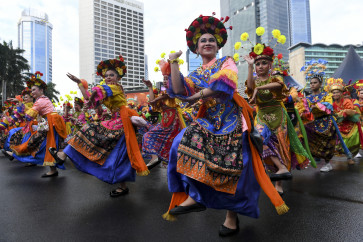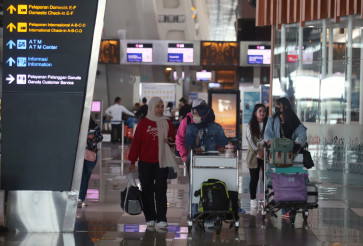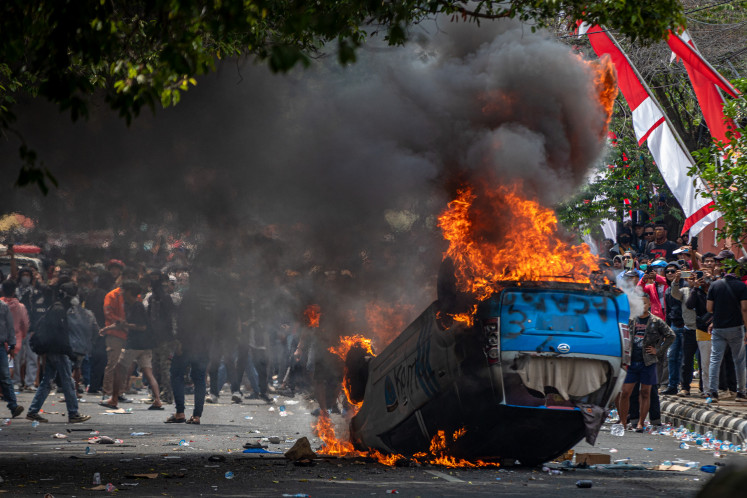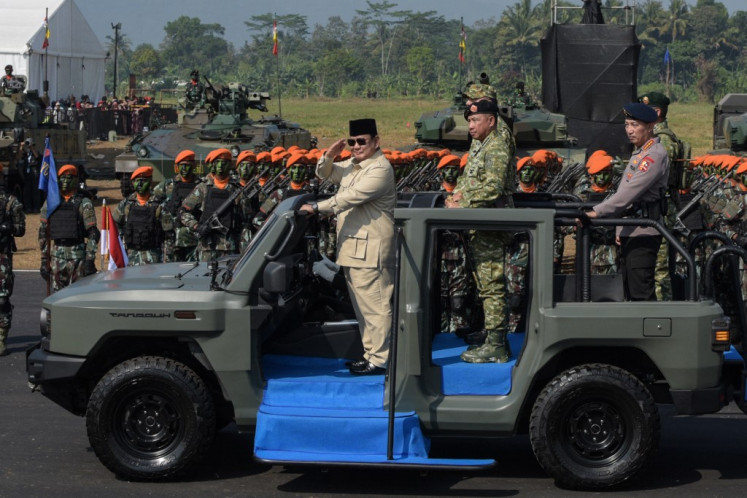Popular Reads
Top Results
Can't find what you're looking for?
View all search resultsPopular Reads
Top Results
Can't find what you're looking for?
View all search resultsPinogu, its soil and its famous coffee
Prime commodity: Ansar checks coffee beans being dried under bright sunlight
Change text size
Gift Premium Articles
to Anyone
Prime commodity: Ansar checks coffee beans being dried under bright sunlight.(JP/Defry Hamid)
Located at the heart of Bogani Nani Wartabone National Park in Gorontalo, northern Sulawesi, Pinogu is a quiet village with a wide variety of agriculture products, including Gorontalo’s famous Pinogu coffee.
To reach the village, which is about 40 kilometers from the national park’s main entrance, visitors have to ride a modified motorcycle due to Pinogu’s extreme terrain conditions.
During the rainy season, the cost for this motorcycle ride could reach up to Rp 1 million (US$71.24) for a return trip since it is riskier to travel through the area at that time. Aside from riding a motorcycle, visitors can also walk for 12 hours, or travel by helicopter.
However, Pinogu’s remoteness is not necessarily a bad thing. The forest around Pinogu helped the area to maintain its water and soil quality, which resulted in fertile soil for farming.
Pinogu Coffee Society chairman Nurdin Maidi said people in Pinogu had been managing their plantation traditionally for a long time. None of the farmers use chemical fertilizers to maintain the soil quality, nor pesticides and herbicides to get rid of insects and unwanted vegetation. They simply get rid of pests using a chopper and improve the soil quality with organic fertilizers.
Unfortunately, massive pest attacks in Pinogu made Nurdin question his ancestors’ beliefs.
“Aside from pests, the dry season also causes the coffee beans to shrivel. During the rainy season, many coffee beans also fall from the trees,” Nurdin said.
The head of the Farming and Agriculture Agency in Bone Bolango, Roswaty, disagreed that such things were caused by the weather. She argued that a lack of treatment, as well as the plant’s age, caused the beans to shrivel.
“According to our Coffee and Cocoa Research Center, the coffee plants in Pinogu have been around for 40 to 50 years. We told them to rejuvenate the plant based on this information,” Roswaty said.
The agency has also distributed organic fertilizer to the Pinogu farmers. The agency also gave 10,000 coffee seeds to the farmers. Still, there has been no action regarding Pinogu farmers’ complaint regarding pest attacks.
Much research supports the Pinogu farmers’ suspicion that pests were attacking the plants.
In a research study entitled “The Impact of Climate Change on Coffee Production in Columbia and Ethiopia”, researcher Joel Iscaro found that the population of a coffee-eating beetle identified as Hypothenemous hampei increases twofold as the temperature rises.
Another study conducted by the Industrial Plants Research Center of Bogor Agricultural University (IPB) revealed that prolonged rainy and dry seasons affected the plant’s productivity.
For example, during El Niño weather phases, coffee productivity decreases to 34 to 79 percent, and 98.5 percent during La Niña weather. The decreasing coffee productivity could lead to farmers switching to another profession.
Fortunately, Pinogu people have an alternative career path other than coffee farming. Data from the Energy and Mineral Resources Agency in Gorontalo shows that Bone Bolango regency has two gold mines located in Tulabolo and Mohulango villages, each of which has 500 miners. Some of the Pinogu villagers work there as freelance miners in addition to farming.
A subsidiary of mining company PT Bumi Resources Mineral (BRMS), PT Gorontalo Minerals, aims to produce 1 million tons of gold and copper ore every year from 2022 to 2052.
Unfortunately, the mine also contradicts the Pinogu people’s mission to keep the forest alive. The mines, which are labelled as illegal mines due to the lack of a mining permit, have been contaminating the nearby river with mercury.
Mining researcher from Gorontalo State University, Yayu Indriati Arifin, said the mines could also reduce the forest land, destroying the soil, as well as causing disease in humans.
Regarding the pressure from the mine’s presence, Yayu said she hoped Pinogu villagers could survive, especially by seeking a better alternative to coffee farming, such as modifying it so it can adapt to climate change.
“Poverty is indeed one of many reasons why we cannot absolve illegal mining problems. However, on the other hand, the environment will be destroyed if this keeps up,” Yayu said.










